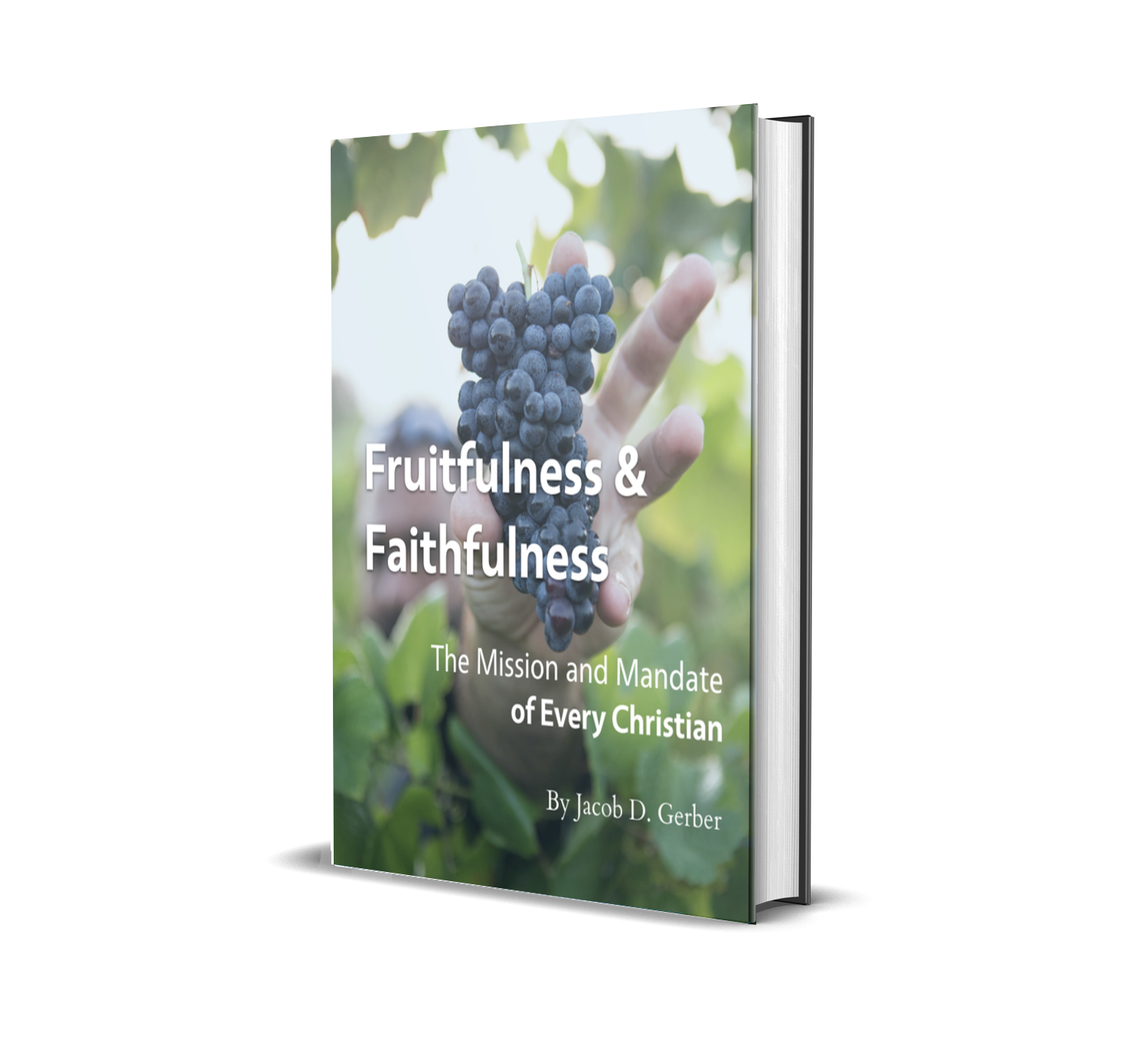Faithfulness: How to Pursue a Fruitful Life
All of us want to live a life worth living. We want to live faithfully for something bigger than ourselves, and we hope to be able to look back on our lives with joy—not with sorrow or regrets.
For Christians, this means that we desire to “bear much fruit” (John 15:5) so that, at the end, we will hear Jesus tell us, “Well done, good and faithful servant. You have been faithful over a little; I will set you over much. Enter into the joy of your master” (Matt. 25:21, 23).
Every believer wants to lead a fruitful and faithful life in the kingdom of Jesus. Fruitfulness is the mission, and faithfulness the mandate, that God entrusts to every Christian.
Burying our Talents
This does not mean, however, that fruitfulness and faithfulness will be easy. The kingdoms of this world allure us with the distractions of their wealth, riches, and false glory. Satan himself seeks to sideline us from the call of Christ’s kingdom by subtle—yet eternally destructive—schemes of temptation.
Even our own hearts manufacture idols for us to worship, stealing glory that rightfully belongs to King Jesus. With all these competing forces, it is astonishingly easy to waste our lives in faithlessness and fruitlessness.
Jesus addresses these threats to our fruitfulness and faithfulness in his Parable of the Talents in Matthew 25:14–30. In the parable, Jesus talks about two servants who wisely invest what the Master entrusts to them and receive the Master’s praise. They exemplify the faithfulness and fruitfulness that we are praying for!
There is a part of us, however, that worries about what we will say when King Jesus asks how we have stewarded the time, talents, and treasures he has entrusted to us. Will we make stammering excuses like the lazy servant?:
[24] He also who had received the one talent came forward, saying, ‘Master, I knew you to be a hard man, reaping where you did not sow, and gathering where you scattered no seed, [25] so I was afraid, and I went and hid your talent in the ground. Here, you have what is yours.’ (Matt. 25:24–25)
King Jesus will not accept this excuse:
[26] But his master answered him, ‘You wicked and slothful servant! You knew that I reap where I have not sown and gather where I scattered no seed? [27] Then you ought to have invested my money with the bankers, and at my coming I should have received what was my own with interest. [28] So take the talent from him and give it to him who has the ten talents. [29] For to everyone who has will more be given, and he will have an abundance. But from the one who has not, even what he has will be taken away. [30] And cast the worthless servant into the outer darkness. In that place there will be weeping and gnashing of teeth.’ (Matt. 25:26–30)
Even if we don’t bury our talents, who wants only to invest the resources Jesus has entrusted to us for a meager interest? We want to live faithfully in such a way that our lives produce abundant fruit.
The True Challenge of Discipleship
For genuine believers, the challenge of discipleship isn’t usually a lack of desire—even though we should continually pray for God to grant us more desire for the King and his kingdom.
Confusion about Faithfulness
Instead, the true challenge of discipleship is often that we don’t know what we should be doing, or how we should be doing it.
We know that our lives, by the grace of God, should glorify King Jesus and create a positive return for his kingdom, but how do we do that? What investment strategies did the two faithful servants actually use to return double what their master invested in them (Matt. 25:16–17, 20, 22)?
What’s worse is that a lack of a clear plan makes it hard to prioritize discipleship in our lives. Life is busy, with so many different voices competing for our attention. In theory, we know that discipleship will require light, momentary sacrifice in exchange for an eternal weight of glory beyond all comparison (2 Cor. 4:17).
Distractions from Faithfulness
In practice, however, it is much easier to devote our time, attention, and effort on the temporal, transient, worldly things that we can see, rather than on the unseen, spiritual things that we can’t see (2 Cor. 4:18)—especially when we don’t know where to start.
Even though we may start our journey with great zeal for the kingdom, our Enemy knows exactly how to sidetrack us. No believer, though should live in confusion about how to invest their God-given gifts for the glory of God’s kingdom. Every Christian should have a clear plan for investing God’s gifts in the kingdom.
A Plan for Faithful Discipleship
It is the responsibility (and privilege!) of the leaders of the church to equip and train every member of the congregation to use his or her gifts. The Apostle Paul writes this:
[11] And he [Christ] gave the apostles, the prophets, the evangelists, the shepherds and teachers, [12] to equip the saints for the work of ministry, for building up the body of Christ, [13] until we all attain to the unity of the faith and of the knowledge of the Son of God, to mature manhood, to the measure of the stature of the fullness of Christ, [14] so that we may no longer be children, tossed to and fro by the waves and carried about by every wind of doctrine, by human cunning, by craftiness in deceitful schemes. [15] Rather, speaking the truth in love, we are to grow up in every way into him who is the head, into Christ, [16] from whom the whole body, joined and held together by every joint with which it is equipped, when each part is working properly, makes the body grow so that it builds itself up in love. (Eph. 4:11–16)
As a pastor, I exist for helping to train and equip you to steward your callings, responsibilities, time, talents, and treasures more faithfully and fruitfully. Discipleship is a lifetime endeavor, but let’s start with two simple steps:
- Evaluate your life with the simple Discipleship Assessment Tool (download instructions below).
- Meet with a pastor, elder, or mentor to talk about your results and create a plan.
The Discipleship Assessment Tool will help you to consider areas for your own personal growth, and will help your spiritual leaders to evaluate what you may need to learn (content), what you may need to pray about (character), what you may need to do (contribution), and what kind of help (coaching) you may need to grow as a disciple right now.
Then, over time, as you put these recommendations into practice, you can continue to use the Discipleship Assessment Tool to evaluate your progress and update your plan to match your growth.
A Vision for Faithful Discipleship
God gives every one of us gifts for the benefit of the church: “But grace was given to each one of us according to the measure of Christ’s gift” (Eph. 4:7). When Jesus returns, our Master will require that we give an account for how we have stewarded those gifts. We must leave the goal of fruitfulness in God’s hands, for God alone gives the growth (1 Cor. 3:6–7).
God gives us, however, the task of faithfulness. Certainly, this does not mean that we can live faithfully apart from God’s grace (1 Cor. 15:10; Phil. 2:12–13). Even the slightest glimmer of faithfulness in our lives comes only as a result of God’s work in us, both to will and to work for his good pleasure. We are dependent upon God’s grace in every facet of our lives, from beginning to end.
Pursuing Fruitfulness through Faithfulness
Instead, this means that God tells us to focus our attention on living faithfully while entrusting the fruitfulness of our efforts to him. Faithfulness, then, is the path by which we pursue God’s fruitfulness. We are simply laborers in the kingdom of Jesus, serving according to what he commands in his word.
As we prayerfully and zealously seek to fulfill God’s mandate for faithfulness, we take confidence in God’s promise for fruitfulness, knowing that, in the Lord, our labor will never be in vain (1 Cor. 15:58). If we abide in Christ, we will bear abundant fruit (John 15:5).
Faithfulness in Time, Talents, and Treasures
This means, then, that we must evaluate how we are investing our time, talents, and treasures for the sake of Christ’s kingdom. Furthermore, it means that we must take stock of the vocations God has given us—the various relationships we have (family, church, neighbors, co-workers), as well as the work he has assigned to us.
The better we understand where God has placed us, the better we will understand how to fulfill God’s mandate for faithfulness—and how to pray for fruitfulness.
No one wants to feel aimless, untrained, and unprepared for the challenges of our lives. Regardless of where Jesus has called you in terms of family, vocation, or giftings, my prayer is that God will equip you to live a fruitful and faithful life in the kingdom of Jesus.
FREE eBook: Fruitfulness and Faithfulness: God’s Mission and Mandate of Every Christian
Grow in God’s Plan for Your Fruitfulness and Faithfulness

Invest Your Life Well
Discover God’s breathtaking vision for the fruitfulness of his people.
Learn how to live fruitfully and faithfully in the kingdom of Jesus.
Download the free eBook now.
Get the eBook
Bonus: You’ll also get a discipleship assessment tool to evaluate areas for you to grow in fruitfulness and faithfulness.




